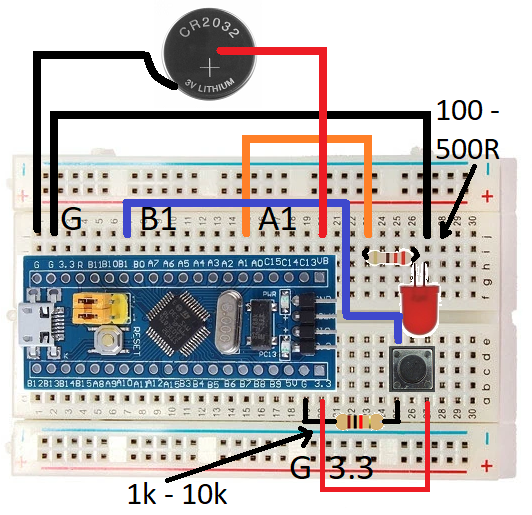Docs
Micro-controllers, wireless transmission and database

Internal RTC/Alarm with Blue Pill using STM32CubeIDE
Prerequisites
This project assumes you have already installed STM32CubeIDE. You need to have previously done a basic blink sketch with blue-pill using STM32CubeIDE. I have made a complete video from installing STM32CubeIDE to LED blink program. You can watch it by clicking this link. https://www.youtube.com/watch?v=kXg467nVd_A
Wiring Diagram

STM32CubeIDE Settings
Click RCC → High Speed Clock (HSE) to Crystal/Ceramic Resonator
Low Speed Clock (LSE) to Crystal/Ceramic Resonator
Click Clock Configuration tab → HCLK (MHz) to 72
Click Pinout and Configuration tab
Click Timer → Click RTC →
Activate Clock Source (Tick)
Activate Calendar (Tick)
RTC OUT → Select RTC Output on Tamper Pin
Configuration → Parameter Settings →
Set Calendar time (Set few mimutes forward as this will be code uploding time
Set Alarm A
Configuration → NVIC Settings →
RTC alarm interrupt through EXTI (Tick)
Set PA1 to GPIO_Output
Set PB1 to GPIO_Input
Additional code on top of STM32CubeIDE generated code
/* USER CODE BEGIN PV */ RTC_TimeTypeDef gTime; /* USER CODE END PV */ /* USER CODE BEGIN WHILE */ while (1) { if(HAL_GPIO_ReadPin(GPIOB, GPIO_PIN_1) == GPIO_PIN_SET) { HAL_GPIO_WritePin(GPIOA, GPIO_PIN_1, 0); } HAL_RTC_GetTime(&hrtc, &gTime, RTC_FORMAT_BIN); // to get hours use -- gTime.Hours // to get minutes use -- gTime.Minutes // to get s econds use -- gTime.Seconds HAL_Delay(500); /* USER CODE END WHILE */ /* USER CODE BEGIN 3 */ } /* USER CODE END 3 */ /* USER CODE BEGIN 4 */ void HAL_RTC_AlarmAEventCallback(RTC_HandleTypeDef *hrtc) { HAL_GPIO_WritePin(GPIOA, GPIO_PIN_1,1); } /* USER CODE END 4 */